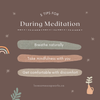
Meditation Tips for Beginners: Finding Peace in Simplicity
, by Paul Walker, 3 min reading time

, by Paul Walker, 3 min reading time
Meditation can be a transformative practice, offering a way to find peace, focus, and clarity amidst the busyness of everyday life. If you’re new to meditation, starting can seem daunting—but it doesn’t have to be. These tips will help you ease into meditation and build a sustainable habit.
There’s no need to dedicate an hour to meditation right away. Start with just 2-5 minutes a day. Gradually increase the duration as you grow more comfortable with the practice. Short, consistent sessions are more effective than occasional, lengthy ones.
You don’t need to sit cross-legged on the floor unless it feels comfortable. You can sit on a chair with your feet flat on the ground, lie down, or even stand. The key is to maintain a posture that keeps you relaxed yet alert.
Your breath is a powerful anchor to the present moment. Pay attention to the sensation of air entering and leaving your nostrils or the rise and fall of your chest. When your mind wanders, gently bring your attention back to your breath without judgment.
Set a timer for your desired meditation duration. This allows you to fully immerse yourself in the experience without worrying about checking the clock. Choose a gentle alarm sound to signal the end of your session.
Apps and online platforms offer a wide variety of guided meditations tailored for beginners. These sessions provide verbal instructions and calming background sounds, making it easier to stay focused and engaged.
Designate a specific spot in your home for meditation. It doesn’t need to be elaborate—a corner with a cushion or chair will suffice. Over time, this space will serve as a visual reminder to meditate and help you establish a routine.
It’s normal for your mind to wander during meditation. Instead of criticizing yourself, acknowledge the distraction and gently guide your focus back to your chosen anchor, whether it’s your breath, a mantra, or a visualization.
Meditation isn’t a one-size-fits-all practice. Explore techniques like mindfulness, body scans, loving-kindness meditation, or mantra repetition to find what resonates with you. Each method offers unique benefits.
Consistency is key to forming a habit. Choose a time that fits seamlessly into your routine, such as after waking up or before bed. This regularity reinforces the habit and helps you stay committed.
Acknowledge your efforts, even if you meditate for just a couple of minutes. Progress in meditation is gradual, and every step counts toward building a more mindful and centered life.
While meditation may feel challenging at first, persistence and patience are your allies. Over time, you’ll likely notice improvements in your mental clarity, emotional balance, and overall well-being. Embrace the journey and allow meditation to become a nurturing part of your daily routine.